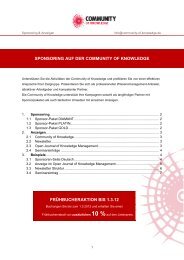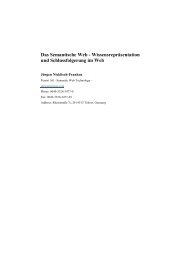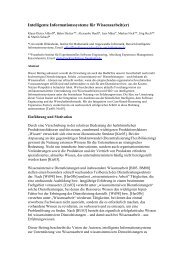OPEN JOURNAL OF KNOWLEDGE MANAGEMENT ...
OPEN JOURNAL OF KNOWLEDGE MANAGEMENT ...
OPEN JOURNAL OF KNOWLEDGE MANAGEMENT ...
Sie wollen auch ein ePaper? Erhöhen Sie die Reichweite Ihrer Titel.
YUMPU macht aus Druck-PDFs automatisch weboptimierte ePaper, die Google liebt.
Knowledge Management Practices in a Successful Research and<br />
Development Organization<br />
By Milad Jasemi and Morteza Piri<br />
Abstract<br />
Open Journal of Knowledge Management<br />
In this paper after a review on the concept and literature of knowledge management, the conceptual<br />
model of a successful knowledge management system that is currently being applied in a<br />
research and development organization is presented and discussed. The main contribution of the<br />
paper is presenting the model in its useful and practical status without becoming involved in theoretical<br />
discussions that have different shapes but similar meanings.<br />
1 Background / Problem<br />
1.1 What have been the challenges for knowledge management (KM)?<br />
Ausgabe V/2012 Seite 13<br />
Sustainable competitive advantage is dependent on building and exploiting core competencies<br />
(Prahalad and Hammel, 1990). So resources which are distinctive and difficult to transfer are<br />
required (Grant, 1991). In recent years, knowledge is being considered as a critical organizational<br />
resource (Carneiro, 2000; Alavi and Leidner, 2001; Drucker, 1993) and is known as the foundation<br />
for stable development (Allameh et al., 2011) especially in hyper competitive environments (Alavi,<br />
1999; Davenportand Prusak, 1998; Zack, 1999) or in environments experiencing radical discontinuous<br />
changes (Malhotra, 2000).<br />
Software project managers for example often interact with each other to address problems rather<br />
than relying on a formal knowledge repository (Newell, 2004) or managers often prefer telephone<br />
calls, meetings, and other personal interactions to obtain information that is timely and often undocumented<br />
(Mintzberg, 1989). Although social interaction with colleagues can be an effective way<br />
to share and reuse knowledge, there are limitations of this method as well like finding the appropriate<br />
person (in spite of any geographical or temporal boundaries) (Adler and Kwon, 2002), effective<br />
articulation of knowledge holder mind especially for beginners that need more time (Markus, 2001)<br />
and most importantly is loosing knowledge when the expert leaves (Hansen et al., 1999, March<br />
and Smith, 1995).<br />
Schultze and Stabell (2004) noted that defining KM is challenging because a complete and agreedupon<br />
definition of knowledge remains elusive. The definition of knowledge is one that has attracted<br />
a significant amount of conjecture (Davenport and Prusak, 1997). While information is often considered<br />
as interpreted data of descriptions, knowledge is considered as action oriented information<br />
that makes possible the transition from information into instructions. Many organizations are<br />
drowning in information overload and yet starving for knowledge (Kanter, 1999). Simply knowledge<br />
has been defined as an understanding awareness, or familiarity acquired through study, investigation,<br />
observation and experience over time (Borg et al., 1993) to improve the quality and success<br />
ratio of the actions (Alavi and Leidner, 1999a and 1999b). KM is becoming a research priority by<br />
the academic community (Salmador and Bueno, 2007) and companies are allocating a greater<br />
share of spending for its implementation (Beijerse, 1999; Call, 2005). It is an amalgamation of concepts<br />
borrowed from artificial intelligence, software engineering, business process re-engineering<br />
, human resources management, organizational behavior (Beckman, 1999), organizational learning<br />
(Argyris and Schon, 1978; Huber, 1991; Nonaka and Takeuchi, 1995) and business reference<br />
models (Scheer, 1994).








